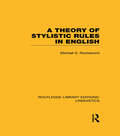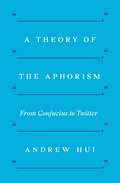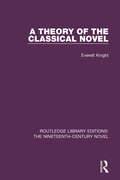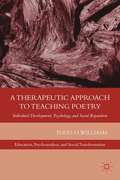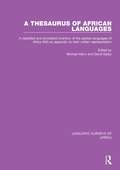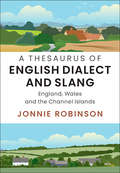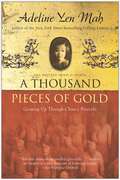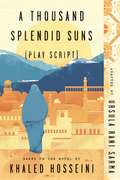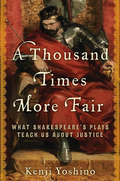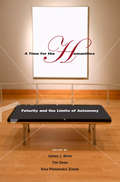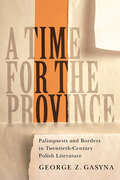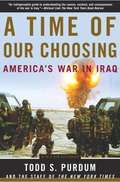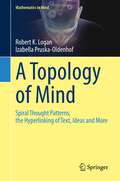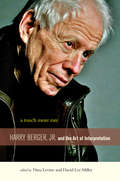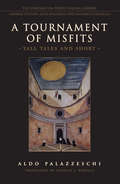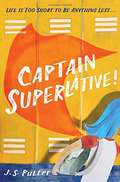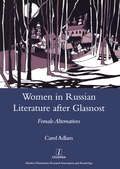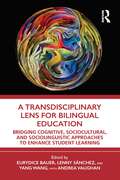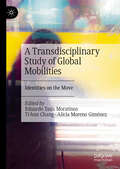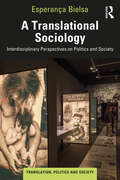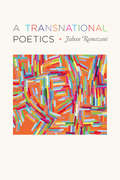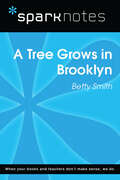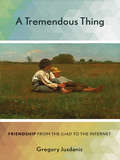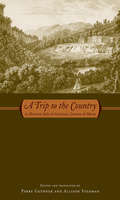- Table View
- List View
A Theory of Stylistic Rules in English (Routledge Library Editions: Linguistics)
by Michael RochemontThis book defends in part a particular elaboration of the stylistic rule component of the grammatical model first presented in Chomsky and Lasnik (1977). It is argued that stylistic rules share a number of fundamental properties, most significantly that they characterize noncanonical focusing constructions and that they make no contribution to the logical forms (LFs) of sentences they apply to in particular regard to truth conditional interpretation. The work includes a discussion of Auxiliary Inversion constructions in English, arguing that these constructions also sometimes involve focusing, though not stylistic. An approach to the interpretation of these sentences is suggested, employing a concept of interpretative templates: rules relating S-structure and LF for which some independent evidence is suggested.
A Theory of the Aphorism: From Confucius to Twitter
by Andrew HuiAn engaging look at the aphorism, the shortest literary form, across time, languages, and culturesAphorisms—or philosophical short sayings—appear everywhere, from Confucius to Twitter, the Buddha to the Bible, Heraclitus to Nietzsche. Yet despite this ubiquity, the aphorism is the least studied literary form. What are its origins? How did it develop? How do religious or philosophical movements arise from the enigmatic sayings of charismatic leaders? And why do some of our most celebrated modern philosophers use aphoristic fragments to convey their deepest ideas? In A Theory of the Aphorism, Andrew Hui crisscrosses histories and cultures to answer these questions and more.With clarity and precision, Hui demonstrates how aphorisms—ranging from China, Greece, and biblical antiquity to the European Renaissance and nineteenth century—encompass sweeping and urgent programs of thought. Constructed as literary fragments, aphorisms open new lines of inquiry and horizons of interpretation. In this way, aphorisms have functioned as ancestors, allies, or antagonists to grand systems of philosophy.Encompassing literature, philology, and philosophy, the history of the book and the history of reading, A Theory of the Aphorism invites us to reflect anew on what it means to think deeply about this pithiest of literary forms.
A Theory of the Classical Novel (Routledge Library Editions: The Nineteenth-Century Novel #23)
by Everett KnightFirst published in 1969, this book asserts that two concepts, structure and praxis, make it impractical for scholars to ignore the necessity of a theory of the novel — with the term ‘classical novel’ used to cover western fiction. The author argues that the novel is fundamentally an ‘enterprise’ — an aspect of the praxis of a particular social class — and that the ways of orthodox scholarship are also a praxis. The investigator must enquire into the nature of their questions as those traditionally put to literature are inspired by ‘irrelevant’ nineteenth century positivism. In the author’s view the book is necessarily a theory of the classical novel and a manifesto for the student movement.
A Therapeutic Approach To Teaching Poetry
by Todd O. WilliamsExplains how the study of poetry, by providing experiences similar to those produced by poetry therapy, can help students discover themselves and develop their potential to effect change in the world.
A Thesaurus of African Languages: A Classified and Annotated Inventory of the Spoken Languages of Africa With an Appendix on Their Written Representation (Linguistic Surveys of Africa #1)
by Michael Mann David DalbyOriginally published in 1987, this thesaurus is concerned with the spoken languages of Africa. Languages are grouped into a relatively large number of sets and subsets within which the relationship of languages to one another is locally apparent and uncontroversial. The volume presents the languages in classified order with notes on each language, their variant names and immediate classification, and reference to the sources consulted. One section offers an exhaustive list of the languages spoken as home languages by local communities in each state, together with details of languages widely used for inter-group communication, given official recognition, or used in education or the media. There are brief phonological analyses of a broad sample of some 20 African languages and a comprehensive bibliography and language index to the whole work
A Thesaurus of English Dialect and Slang: England, Wales and the Channel Islands
by Jonnie RobinsonA thesaurus of present-day vernacular English from Berwick-upon-Tweed to the Channel Islands, this unique record of everyday English celebrates established regional dialects, emerging new varieties and colloquial forms young and old. Based on a prestigious nationwide survey, BBC Voices Recordings, it documents the linguistic landscape of England, Wales and the Channel Islands in the 21st century, and includes over 3000 separate entries, drawn from over 200 locations across the country. Each entry contains information about the term's origins, location and the social distribution of its users. With links to original sound files and cross-references to complementary dictionary sources, it is an authoritative reference work for academic linguists, but its accessible presentation also makes it suitable for creative audiences and non-specialist language enthusiasts seeking authentic, up-to-date information on British English dialect and slang, and for English language teachers and learners as an invaluable educational tool.
A Thousand Pieces of Gold: Growing Up Through China's Proverbs
by Adeline Yen MahIn this poignant memoir the New York Times bestselling author of Falling Leaves, Adeline Yen Mah, provides a fascinating window into the history and cultural soul of China. Combining personal reflections, rich historical insights, and proverbs handed down to her by her grandfather, Yen Mah shares the wealth of Chinese civilization with Western readers. Exploring the history behind the proverbs, she delves into the lives of the first and second emperors and the two rebel warriors who changed the course of Chinese life, adding stories from her own life to beautifully illustrate their relevance and influence today.
A Thousand Splendid Suns (Play Script): Based on the novel by Khaled Hosseini
by Ursula Rani SarmaThe script for the stage production of the bestselling Khaled Hosseini novel A Thousand Splendid Suns, as adapted by playwright Ursula Rani Sarma.Born a generation apart and with very different ideas about love and family, Mariam and Laila are two women brought jarringly together by war, by loss, and by fate. As they endure the ever-escalating dangers around them--in their home, as well as in the streets of Kabul--they come to form a bond that makes them both sisters and mother-daughter to each other, and that will ultimately alter the course not just of their own lives but of the next generation. With heart-wrenching power and suspense, playwright Ursula Rani Sarma reimagines Hosseini's novel to show how a woman's love for her family can move her to shocking and heroic acts of self-sacrifice, and that in the end it is love, or even the memory of love, that is often the key to survival.A stunning accomplishment, this reimagination of A Thousand Splendid Suns is a haunting, heartbreaking, compelling production about unlikely friendship and indestructible love.This adaptation was first performed by the American Conservatory Theater in San Francisco in February 2017.
A Thousand Times More Fair: What Shakespeare's Plays Teach Us About Justice
by Kenji Yoshino“Fascinating....Loaded with perceptive and provocative comments on Shakespeare’s plots, characters, and contemporary analogs.”—Justice John Paul Stevens, Supreme Court of the United States“Kenji Yoshino is the face and the voice of the new civil rights.”—Barbara Ehrenreich, author of Nickled and DimedA Thousand Times More Fair is a highly inventive and provocative exploration of ethics and the law that uses the plays of William Shakespeare as a prism through which to view the nature of justice in our contemporary lives. Celebrated law professor and author Kenji Yoshino delves into ten of the most important works of the Immortal Bard of Avon, offering prescient and thought-provoking discussions of lawyers, property rights, vengeance (legal and otherwise), and restitution that have tremendous significance to the defining events of our times—from the O.J. Simpson trial to Abu Ghraib. Anyone fascinated by important legal and social issues—as well as fans of Shakespeare-centered bestsellers like Will in the World—will find A Thousand Times More Fair an exceptionally rewarding reading experience.
A Time for the Humanities: Futurity and the Limits of Autonomy
by Tim Dean Ewa Plonowska ZiarekThis book brings together an international roster of renowned scholars from disciplines including philosophy, political theory, intellectual history, and literary studies to address the conceptual foundations of the humanities and the question of their future. What notions of the future, of the human, and of finitude underlie recurring anxieties about the humanities in our current geopolitical situation? How can we think about the unpredictable and unthought dimensions of praxis implicit in the very notion of futurity?The essays here argue that the uncertainty of the future represents both an opportunity for critical engagement and a matrix for invention. Broadly conceived, the notion of invention, or cultural poiesis, questions the key assumptions and tasks of a whole range of practices in the humanities, beginning with critique, artistic practices, and intellectual inquiry, and ending with technology, emancipatory politics, and ethics. The essays discuss a wide range of key figures (e.g., Deleuze, Freud, Lacan, Foucault, Kristeva, Irigaray), problems (e.g., becoming, kinship and the foreign, "disposable populations" within a global political economy, queerness and the death drive, the parapoetic, electronic textuality, invention and accountability, political and social reform in Latin America), disciplines and methodologies (philosophy, art and art history, visuality, political theory, criticism and critique, psychoanalysis, gender analysis, architecture, literature, art). The volume should be required reading for all who feel a deep commitment to the humanities, its practices, and its future.
A Time for the Province: Palimpsests and Borders in Twentieth-Century Polish Literature
by George Z. GasynaWithin discourses on Polish provincial or marginal literature, the eastern borderlands are a richly symbolic region that inspires much fascination and study.Through close readings, surveys, and analyses of transborder narratives by seven modern writers who hailed from the Polish borderlands or set their works there, A Time for the Province demonstrates how the region has come to represent a palimpsest of cultural identities and myths as each new generation unearths and rediscovers them. George Gasyna explores and theorizes the province as a space of grand utopian visions and dystopic gestures about both the Polish past and a Polish future. Offering a novel literary and cultural history of modern Polish writing, he paves the way toward productive new modes of conceptualizing the cultural and literary forms that have come from Central Europe over the last century, challenging many basic assumptions about what this literature can offer its readership in Poland and around the world.Through engagement with the theoretical apparatuses of postmemory studies and border studies, A Time for the Province redefines Polish cultural identity in the current moment of postsocialist transition and globalized citizenship.
A Time of Our Choosing: America's War in Iraq
by Todd S. PurdumIt was a war like no other the United States had ever fought. It began with the bombing of Saddam Hussein’s bunker and ended with statues of the Iraqi dictator being toppled in downtown Baghdad, and it marked a turning point in America’s relations with its enemies, its allies, and its sense of itself. Yet most Americans experienced the war as impressionistic and often confusing—the story of one battle here, one unit there, a report from one city, then another, without the larger context we so urgently needed. Each reporter had his “slice” of the war, it seemed, but no one had the whole story or the broad view. A Time of Our Choosing fills that gap brilliantly, drawing on the unparalleled resources and reportage of The New York Times. Todd S. Purdum, one of the paper’s most gifted storytellers, traces the war in Iraq from the first rumblings after 9/11, to the diplomatic recriminations at the United Nations, to the battles themselves and their aftermath. He deftly rolls out the whole canvas before our eyes, showing how the individual “slices” fit together into a single, gripping drama. Purdum also explores the complex legacy of America’s near-unilateral action. Since the 9/11 attacks, President George W. Bush has vowed that the United States would confront its enemies “at a time of our choosing,” and Purdum shows in vivid terms what this choice has meant for our now transformed world.
A Tolkien Compass
by Jared C. LobdellFor those avid J. R. R. Tolkien fans who have spent time thinking and discussing the moral, religious, psychological, literary and political aspects of The Hobbit and The Lord of the Rings, this book will prove a treat!' ELEVEN ESSAYS AND ARTICLES, INCLUDING: --GOLLUM'S CHARACTER TRANSFORMATION IN THE HOBBIT Examines the extensive revisions Tolkien made in the second hardcover edition of The Hobbit and demonstrates how the character of Gollum is made more evil to fit his later role in the trilogy, --THE CORRUPTION OF POWER A fascinating study of the use and abuse of power as presented by Tolkien. --NARRATIVE PATTERN IN THE FELLOWSHIP OF THE RING In this study of Tolkien's structuring of his fiction, we see how the Master has reversed the usual quest pattern and objectives: instead of seeking an object, Frodo seeks to dispose of one--the ring. The intricacies of Tolkien's puns, the moral geography of Middle-earth, the true character of the Fellowship and the hobbits' friends and foes, the sheer musical beauty of the names Tolkien invents--all are given careful attention. Tolkien's consuming involvement in his books merits this loving exactness. W. H. Auden wrote that he was especially astounded by Tolkien's gift for inventing proper names. Auden would have avidly studied the final offering of this book. For here is a true polestar for all wandering Tolkien fans: Tolkien's own unpublished "Guide to the Names in The Lord of the Rings." Originally, Tolkien prepared the guide for translators of his work. Here, he shares his dragon-hoard of etymological treasures. His asides to the reader on how he came to choose some of the names bring us into Tolkien's own cozy studyroom.
A Topology of Mind: Spiral Thought Patterns, the Hyperlinking of Text, Ideas and More (Mathematics in Mind)
by Robert K. Logan Izabella Pruska-OldenhofThis volume covers many diverse topics related in varying degrees to mathematics in mind including the mathematical and topological structures of thought and communication. It examines mathematics in mind from the perspective of the spiral, cyclic and hyperlinked structures of the human mind in terms of its language, its thoughts and its various modes of communication in science, philosophy, literature and the arts including a chapter devoted to the spiral structure of the thought of Marshall McLuhan. In it, the authors examine the topological structures of hypertext, hyperlinking, and hypermedia made possible by the Internet and the hyperlinked structures that existed before its emergence. It also explores the cognitive origins of mathematical thinking of the human mind and its relation to the emergence of spoken language, and studies the emergence of mathematical notation and its impact on education. Topics addressed include:• The historical context of any topic that involves how mathematical thinking emerged, focusing on archaeological and philological evidence. • Connection between math cognition and symbolism, annotation and other semiotic processes. • Interrelationships between mathematical discovery and cultural processes, including technological systems that guide the thrust of cognitive and social evolution. • Whether mathematics is an innate faculty or forged in cultural-historical context• What, if any, structures are shared between mathematics and language
A Touch More Rare: Harry Berger, Jr., and the Arts of Interpretation
by Harry BergerHarry Berger, Jr., has long been one of our most revered and respected literary and cultural critics. Since the late nineties, a stream of remarkable and innovative publications have shown how very broad his interests are, moving from Shakespeare to baroque painting, to Plato, to theories of early culture.In this volume a distinguished group of scholars gathers to celebrate the work of Harry Berger, Jr. To "celebrate," in Berger's words, is "to visit something either in great numbers or else frequently-to go away and come back, go away and come back, go away and come back. Celebrating is what you do the second or third time around, but not the first. To celebrate is to revisit. To revisit is to revise. Celebration is the eureka of revision." Not only former students but distinguished colleagues and scholars come together in these pages to discover Berger's eurekas-to revisit the rigor and originality of his criticism, and occasionally to revise its conclusions, all through the joy of strenuous engagement. Nineteen essays on Berger's Shakespeare, his Spenser, his Plato, and his Rembrandt, on his theories of interpretation and cultural change and on the ethos of his critical and pedagogical styles, open new approaches to the astonishing ongoing body of work authored by Berger. An introduction by the editors and an afterword by Berger himself place this festival of interpretation in the context of Berger's intellectual development and the reception of his work from the mid-twentieth century into the first decade of the twenty-first.
A Tournament of Misfits
by Aldo Palazzeschi Nicolas J. PerellaAldo Palazzeschi (1885-1974) is arguably the major twentieth-century Italian writer who has been most neglected by the English-speaking world. Born in Florence and trained as an actor, Palazzeschi ranks high as a poet and fiction writer in his homeland. His work, which attempts to recreate the experience of a spectator watching and listening to a character on stage, won him the praise of F.T. Marinetti, the founder of Italian futurism, who enrolled the young poet in his avant-garde coterie despite the fact that, stylistically, Palazzeschi's work had little in common with futurism.A Tournament of Misfits brings together a selection of Palazzeschi's short fiction for the first time in English. Through clear and fluid translations, Nicolas J. Perella demonstrates Palazzeschi's use of laughter to debunk social and literary myths. As a social being, Palazzeschi felt himself a deviant, but he was saved from a self-destructive bitterness by his capacity for irony, which he often directed at himself as well as at others. Yet, it would be a mistake not to see the desperate yearning for liberation from society's rigid code behind the irony and the fun in Palazzeschi's work. With this translation, Perella brings Palazzeschi to life for a new audience to appreciate.
A Tower of Giraffes: Animal Bunches
by Anna WrightA drove of pigs, a romp of otters, an ostentation of peacocks, and a tower of giraffes. . . . This clever book introduces young readers to some of the words we use to refer to animals in a group. The ink, watercolor, and fabric collage art is brightly colored and uniquely sets this fun book apart from the crowd. Each page presents information about an animal and its group behavior, such as how geese fly in a V-shape and honk to encourage the leaders, and that sometimes tens of thousand of flamingos meet up in one location. <P><P>Lexile Measure: AD940L
A Tradition of Infringement: Women in Russian Literature After Glasnost
by Carol Adlam"The Russian literary world was shaken by the wide-reaching reforms of the late Soviet period (1985-91) and the Soviet Union's subsequent collapse. During this time the phenomenon of 'alternative' literature emerged, characterized by an emphasis on thematic, structural, and linguistic transgression of both Soviet-era values and the enduring Russian tradition of civic engagement and moral edification through literature. Through close textual analysis, Adlam examines the relationship of this literary phenomenon to issues of gender and creative authority, providing detailed discussion of several of the most significant women writers of the period, among them Valeriia Narbikova, Liudmila Petrushevskaia and Nina Sadur."
A Transdisciplinary Lens for Bilingual Education: Bridging Cognitive, Sociocultural, and Sociolinguistic Approaches to Enhance Student Learning
by Yang Wang Eurydice Bauer Lenny Sánchez Andrea VaughanAddressing the intersections between cognitive, sociocultural, and sociolinguistic research, this volume explores bilingual development across educational contexts to discuss and uncover the influences and impact of language in school programming and everyday practices. Confronting a standard monolingual lens, this collection highlights the importance of applying cross-disciplinary approaches to examine bilingualism in relation to topics such as language politics, linguistic identities, students’ experiences at home and in schools, asset-based teaching and curricula, and overall benefits. Ideal for courses in bilingualism, literacy, psychology, and language education, this text is an important resource for understanding and applying transdisciplinary, inclusive approaches to positively influence cognitive development, academic learning, and identity formation in bilingual education.
A Transdisciplinary Study of Global Mobilities: Identities on the Move
by Eduardo Tasis Moratinos Ti-Han Chang Alícia Moreno GiménezIdentities on the Move interrogates the categories given and adopted by people on the move through a transdisciplinary and global approach that includes social and political sciences and the arts. It brings together experiences of displacement from a variety of cultural and national backgrounds, including Brazilians, Chinese, Koreans, South Italians, Africans, Muslims, Arabophobe migrants, Iranians, Pakistanis, Bosnians, Latin Americans and Eastern Europeans. It looks at their identity-negotiating processes in different geographies across the globe, namely Japan, UK, Palestine, Italy, Australia, Europe and North America. This multi-geographical and multi-disciplinary approach allows us to decentralise previous narratives of migration by reformulating them against coloniality and invisibility and presenting them within a richer and changing contemporary map of dynamic identities. The global scale of the case studies included in this volume also allows for a wider exploration of thematic concepts within the (trans)formation of displaced identities, such as assimilation versus alienation, memory and trauma, stigmatisation, enculturation, acculturation and deculturation. In a nutshell, this volume highlights current complexities of identity formation in a global scene that is moving away from homogenous nations by presenting a multi-layered and multi-spatial notion of belonging.
A Translational Sociology: Interdisciplinary Perspectives on Politics and Society (Translation, Politics and Society)
by Esperança BielsaA Translational Sociology provides an interdisciplinary investigation of the key role of translation in society. There is a growing recognition of translation’s intervention in the intellectual history of sociology, in the international reception of social theory, and in approaches to the global literary and academic fields. This book brings attention to aspects of translation that have remained more elusive to sociological interpretation and analysis, investigating translation’s ubiquitous presence in the everyday lives of ordinary people in increasingly multilingual societies and its key intervention in mediating politics within and beyond the nation. In order to challenge a reductive view of translation as a relatively straightforward process of word substitution that is still prevalent in the social sciences, this book proposes and develops a broader definition of translation as a social relation across linguistic difference, a process of transformation that leaves neither its agent nor its object unchanged. The book offers elaborations of the social, cultural and political implications of such an approach, as a broad focus on these various perspectives and their interrelations is needed for a fuller understanding of translation’s significance in the contemporary world. This is key reading for advanced students and researchers of translation studies, social theory, cultural sociology and political sociology.
A Transnational Poetics
by Jahan RamazaniPoetry is often viewed as culturally homogeneous—“stubbornly national,” in T. S. Eliot’s phrase, or “the most provincial of the arts,” according to W. H. Auden. But in A Transnational Poetics, Jahan Ramazani uncovers the ocean-straddling energies of the poetic imagination—in modernism and the Harlem Renaissance; in post–World War II North America and the North Atlantic; and in ethnic American, postcolonial, and black British writing. Cross-cultural exchange and influence are, he argues, among the chief engines of poetic development in the twentieth and twenty-first centuries. Reexamining the work of a wide array of poets, from Eliot, Yeats, and Langston Hughes to Elizabeth Bishop, Lorna Goodison, and Agha Shahid Ali, Ramazani reveals the many ways in which modern and contemporary poetry in English overflows national borders and exceeds the scope of national literary paradigms. Through a variety of transnational templates—globalization, migration, travel, genre, influence, modernity, decolonization, and diaspora—he discovers poetic connection and dialogue across nations and even hemispheres.
A Tree Grows in Brooklyn (SparkNotes Literature Guide Series)
by SparkNotesA Tree Grows in Brooklyn (SparkNotes Literature Guide) by Betty Smith Making the reading experience fun! Created by Harvard students for students everywhere, SparkNotes is a new breed of study guide: smarter, better, faster. Geared to what today's students need to know, SparkNotes provides: *Chapter-by-chapter analysis *Explanations of key themes, motifs, and symbols *A review quiz and essay topicsLively and accessible, these guides are perfect for late-night studying and writing papers
A Tremendous Thing: Friendship from the "Iliad" to the Internet
by Gregory Jusdanis"Why did you do all this for me?" Wilbur asked. "I don't deserve it. I've never done anything for you." “You have been my friend,” replied Charlotte. “That in itself is a tremendous thing.” —from Charlotte's Web by E. B. White Friendship encompasses a wide range of social bonds, from playground companionship and wartime camaraderie to modern marriages and Facebook links. For many, friendship is more meaningful than familial ties. And yet it is our least codified relationship, with no legal standing or bureaucratic definition. In A Tremendous Thing, Gregory Jusdanis explores the complex, sometimes contradictory nature of friendship, reclaiming its importance in both society and the humanities today. Ranging widely in his discussion, he looks at the art of friendship and friendship in art, finding a compelling link between our need for friends and our engagement with fiction. Both, he contends, necessitate the possibility of entering invented worlds, of reading the minds of others, and of learning to live with people. Investigating the ethics, aesthetics, and politics of friendship, Jusdanis draws from the earliest writings to the present, from the Epic of Gilgamesh and the Iliad to Charlotte's Web and “Brokeback Mountain,” as well as from philosophy, sociology, evolutionary biology, psychology, and political theory. He asks: What makes friends stay together? Why do we associate friendship with mourning? Does friendship contribute to the formation of political communities? Can friends desire each other? The history of friendship demonstrates that human beings are a mutually supportive species with an innate aptitude to envision and create ties with others. At a time when we are confronted by war, economic inequality, and climate change, Jusdanis suggests that we reclaim friendship to harness our capacity for cooperation and empathy.
A Trip to the Country: by Henriette-Julie de Castelnau, Comtesse de Murat
by Perry Gethner Allison Stedman Henriette-Julie de Castelnau Comtesse De MuratTranslates an important example of late seventeenth-century French hybrid experimental fiction that provided the primary literary backdrop for the first French fairy tales.
